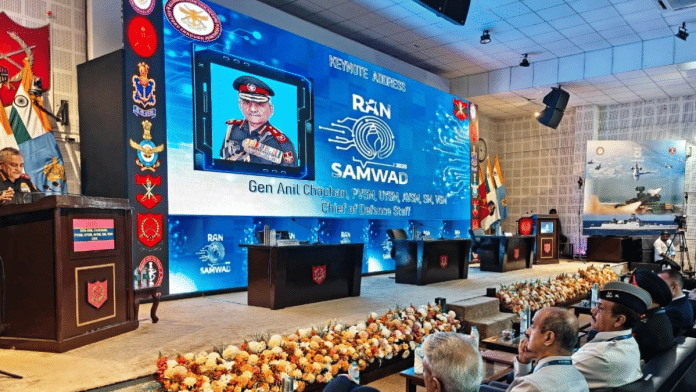Mhow: Chief of Defence Staff (CDS) General Anil Chauhan Tuesday said that Operation Sindoor was a modern conflict from which a number of lessons have been learnt and are under implementation.
He also underlined that India is not a pacifist even as it stands on the side of peace while acknowledging that power ensures peace.
At the first edition of Ran Samwad, a tri-service military seminar meant to be eventually like the Shangri-La Dialogue, in Army War College, Mhow, Gen Chauhan also said the armed forces must focus themselves on war, warfare and war-fighting.
War is the broader state of armed conflict while warfare refers to the specific methods, tactics and strategies used to conduct the war, he explained. Warfighting is the application of military tactics and strategy to achieve the objectives of the war, he said.
“These are the military’s bread and butter,” the CDS said.
The CDS added that while geo-politics, diplomatic or international relations were important, it could also be a distraction. “We must focus on our primary job. It’s my attempt to reshape the dominant narrative in the armed forces towards this basic job of war, warfare and warfighting,” he said.
Highlighting the importance of this initiative, the CDS said that the focus was on technology and how it would impact modern warfare.
“Operation Sindoor was a modern conflict from which we learned a number of lessons, and most of them are under implementation, some have been implemented. The operation is still on. We are not here to discuss Operation Sindoor. We are here to discuss something beyond Operation Sindoor,” he said.
In his view, Gen Chauhan said, there were four essential trends coming out in modern reality.
“First, there is an increased propensity amongst nations and governments to use force, and this is happening because political objectives today can be achieved by short-duration conflicts… The second trend which I see is a lack of distinction between war and peace; this particular era, which we knew in the past of declared wars, I think that’s all over.
“Contemporary warfare today is a kind of continuum of five Cs—competition, crisis, confrontation, conflict and combat, between wars,” he said, addressing top military officers including Defence Attaches including those from Bangladesh, the US, France, South Korea and Australia among others.
The third important thing, he said, is the importance of people. “In the past wars, because of territory and ideology, people and soldiers were sacrificed. The fourth important trend I think we can debate is the matrices of victory and how we perceive victory,” he said, adding that past matrices of victory were defined by losses inflicted in terms of men and equipment.
“In 1971, we had 95,000 Pakistanis captured… But in today’s warfare, probably the new matrices of warfare or victory are the speed and tempo of operations, effects of long-range precision strikes,” he said, adding that “perhaps, narrative building also.”
As for India’s perspective on military strength and war, he said the country has always stood on the side of peace. “We are a peace-loving nation, but don’t get mistaken, we cannot be pacifists. I think peace without power is Utopian. I like to state a Latin quote which translates, ‘if you want peace, prepare for war’.”
India, he said, has always spoken about ‘Shastra’ and ‘Shaastra’ in the same breath, which “are actually the two blades of the same sword.”
“We know that a combination of military strategy and warriors is essential to win, and the foremost and best example of this is the Mahabharata and the Gita. We are aware that Arjuna was the greatest warrior of all time, yet he needed a Krishna to guide him towards victory… Similarly, we had Chandragupta who needed the wisdom of Chanakya… India has been a land of Gautam Buddha, Mahavir Jain and Mahatma Gandhi, all champions of non-violence,” he asserted.
(Edited by Tony Rai)
Also Read: Secret to Pakistan aircraft losses in Op Sindoor could lie in Martin-Baker’s ejection seats records






